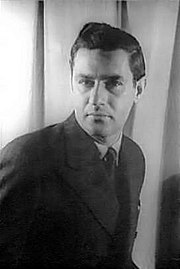Martin's Lie
| Martin's Lie | |
|---|---|
| Chamber opera for television by Gian Carlo Menotti | |
 The composer in 1944 | |
| Librettist | Menotti |
| Language | English |
| Premiere | 3 June 1964 |
Martin's Lie is a chamber opera in one act with music and an English language libretto by Gian Carlo Menotti. Commissioned by CBS, it was Menotti's third opera for television after Amahl and the Night Visitors and Labyrinth. Although not initially conceived as a work for the stage, the opera premiered in a live theatrical performance on 3 June 1964 at the Bristol Cathedral for the opening of the 17th annual Bath International Music Festival.[1] The opera was subsequently filmed with the same cast for television under the direction of Kirk Browning with Julie Andrews serving as host. The production used sets and costumes by designer Anthony Powell, and was broadcast nationally by CBS for the opera's United States television premiere on 30 May 1965.[2]
The first live performance of the opera in the United States was at the Washington National Cathedral in 1976, with Paul Callaway conducting both Martin's Lie and the world premiere of Menotti's The Egg.[3] The cast included Gene Tucker as Father Cornelius, Simon Jackson as Martin, Richard Dirksen as the Fugitive, Dana Krueger as the Housekeeper, and Gimi Beni as the Sheriff.[4]
Roles[]
| Role | Voice type | Premiere Cast, 3 June 1964 (Conductor: Lawrence Leonard) |
|---|---|---|
| Martin | boy soprano | Michael Wennink |
| Stranger | baritone | Donald McIntyre |
| Naninge, a nurse | mezzo-soprano | |
| Father Cornelius | tenor | William McAlpine |
| Sheriff | bass | Otakar Kraus |
| Christopher | boy soprano | Keith Collins |
| Timothy | boy soprano | Roger Nicholas |
| Executioner | silent role | Hugh Smith Marriott |
| Soldiers | silent roles | |
| Orphans (boy's chorus) | ||
Plot[]
Setting- An orphanage in medieval Germany
Martin, a 12‐year‐old orphan boy, deeply desires to have a father. An escaping heretic enters the orphanage in order to hide from his pursuers. Martin hides him and forms an emotional attachment to the stranger. Martin is questioned and threatened by the sheriff who is pursuing the stranger, and he lies to protect him. Martin ultimately becomes so frightened by the threats that he is literally scared to death. His refusal to betray the stranger out of love and faith makes Martin "a figure of moral power, an image of redemption. Father Cornelius, the well intentioned, ineffectual shepherd of the orphans, makes the summary point—the force of love is stronger than any sin."[1]
References[]
- ^ a b (June 5, 1964). "Opera By Menotti Bows In England: Premiere of 'Martin's Lie' Sung in Bristol Cathedral". The New York Times.
- ^ Howard Klein (May 31, 1965). "TV: New Menotti Opera; 'Martin's Lie' Given Belated U.S. Premiere by C.B.S. -- Meant for Church Groups". The New York Times.
- ^ Paul Hume (June 13, 1976). Gian Carlo Menotti: 'The Egg and I'. The Washington Post. p. 135-H1.
- ^ Donald L. Hixon (2000). Gian Carlo Menotti: A Bio-bibliography. Greenwood Publishing Group. p. 196. ISBN 0-313-26139-3.
- 1964 operas
- Chamber operas
- English-language operas
- One-act operas
- Operas
- Operas by Gian Carlo Menotti
- Operas for television